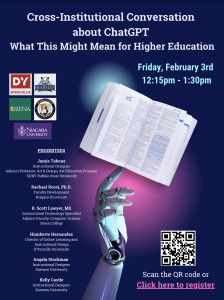 Recently, Daemen Faculty have been actively engaged in how Artificial Intelligence (AI) technology may affect learning in the classroom. Angela Stockman and Kelly Castle, both Instructional Designers at Daemen University, participated in a panel discussion in February on ChatGPT, an AI tool – or chatbot – making news for its ability to take written input from users to generate human-like responses such as poetry, essays, and research data. Stockman and Castle joined professionals from SUNY Buffalo State University, Niagara University, Siena College, and D’Youville University in presenting during the webinar which was attended by nearly 100 professionals including college administrators and faculty members.
Recently, Daemen Faculty have been actively engaged in how Artificial Intelligence (AI) technology may affect learning in the classroom. Angela Stockman and Kelly Castle, both Instructional Designers at Daemen University, participated in a panel discussion in February on ChatGPT, an AI tool – or chatbot – making news for its ability to take written input from users to generate human-like responses such as poetry, essays, and research data. Stockman and Castle joined professionals from SUNY Buffalo State University, Niagara University, Siena College, and D’Youville University in presenting during the webinar which was attended by nearly 100 professionals including college administrators and faculty members.
The ChatGPT tool is based on the GPT (Generative Pretrained Transformer) language model and is finding application in education, business, social media, and other areas. One of the most powerful language processing AI models, ChatGPT can generate content rapidly such as writing and drawing and can be used to help create video. According to Stockman, the tool offers many positive aspects for higher education, however, there are also some drawbacks.
“ChatGPT can be a great study tool for students and can assist schools in designing curriculum, creating assignments, performing research, and so forth,” she explains. “At the same time, like any new technology, it also has the potential to be disruptive – it can produce false information and some schools fear a negative impact on learning if students rely on the tool to write papers and essays for them.”
Forbes Magazine tested ChatGPT and found the technology was capable of writing two college essays in 20 minutes. Creators of the technology have developed what they call DetectGPT to help teachers detect writing and content generated by students using ChatGPT. Still, there are questions about its effect on higher education.
That is why Stockman says critical discourse among professionals such as the webinar is so important. “ChatGPT is so new, schools, colleges and universities must be discriminating in its use,” she concludes. “It was inspiring to be part of the conversation with colleagues as we continue to understand the many opportunities and cautions ChatGPT presents.”
